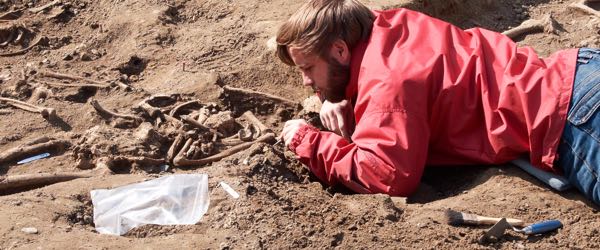What is a Paleontologist?
Paleontology is more than just dinosaurs! A paleontologist is a scientist who studies the fossilized remains of all kinds of organisms (plants, animals, fungi, bacteria and other single-celled living things), and is interested in knowing the history of organic life on earth. Specific work will vary depending on the scope of research or discoveries, and may involve working closely with archeology teams.
What does a Paleontologist do?

A paleontologist works out the relationships between extinct plants and animals and their living relatives today. They study fossils, using them to put together pieces of history that made up the earth and life on it. Fossils are defined as any trace of a past life form, and most fossils are several thousands to several millions or billions of years old. In trying to understand extinction events of the past, they hope to apply their scientific conclusions to extinction in the modern world as environments and global climates change.
There are several areas of study within paleontology that aspiring paleontologists can choose from:
Biostratigraphy - The study of the vertical distribution of fossils in rocks
Invertebrate Paleontology - The study of fossils of animals without backbones
Paleobotany - The study of plant fossils
Micropaleontology - The study of fossils of single-celled organisms
Vertebrate Paleontology - The study of fossils of animals with backbones
Paleoecology - The study of ancient ecosystems and how they developed
Taphonomy - The study of how fossils form and are preserved
Typical things a paleontologist does:
- determines location of fossils
- excavates layers of sedimentary rock to locate fossils
- gathers information on the fossils (age, location, etc)
- uses specific tools to excavate (chisels, drills, picks, shovels, brushes)
- evaluates any discoveries by using specialized computer programs
- compares new data to existing data
- analyzes findings in the lab
- identifies time period of fossils found
- shares results with colleagues from other scientific disciplines
Note the differences between Paleontologists, Archaeologists and Anthropologists:
Paleontologists - study all life forms, and all types of organisms
Archaeologists - study objects, or artifacts, that have been made by humans
Anthropologists - study ancient cultures, societies, ways of life, and languages
What is the workplace of a Paleontologist like?
A paleontologist can work in museums and historical exhibits, oil, gas and mining companies, the government, colleges, universities, and as a consultant. Many paleontologists travel around the world digging up fossils and preserving them.
Frequently Asked Questions
What is the difference between a geologist and a paleontologist?
A geologist is someone who is involved in the study of the outer layer of the earth's crust. The objective of geology is to understand the history of the planet we live on; to better predict the future and to explain current occurrences of earthquakes, volcanic eruptions, and landslides.
A paleontologist, on the other hand, looks at fossil remains on many types of organisms on the earth's surface. Paleontology is the study of primitive life, including plant and animal organisms, fungi, bacteria, etc.
Paleontologists are also known as:
Palaeontologist